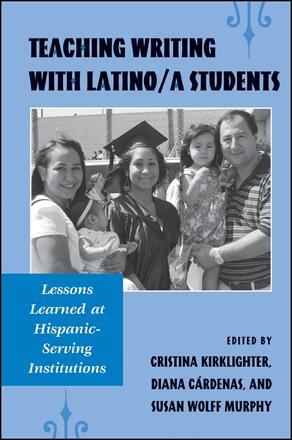
Teaching Writing with Latino/a Students
Lessons Learned at Hispanic-Serving Institutions
Engages the complexities of teaching Latino/a students at Hispanic-Serving Institutions.
Description
This groundbreaking collection brings together the eclectic voices of two-year and four-year writing teachers at Hispanic-Serving Institutions (HSIs) throughout the United States to explore the complexities of teaching writing with Latino/a students. Made up of narratives, qualitative studies, and conversations, the book presents the theories and practices of these experienced teachers. Its strength lies in the diversity of perspectives and methods used by these teachers to address many of the issues central to teaching Latino/a and other minority students: acknowledgment of difference, respect for diversity, student identity, students' right to their own language, and the valuing of home and school literacies and languages.
At Texas A&M University at Corpus Christi, Cristina Kirklighter is Associate Professor of English and the author of Traversing the Democratic Borders of the Essay, also published by SUNY Press, Diana Cárdenas is Associate Professor of English, and Susan Wolff Murphy is Assistant Professor of English.
Reviews
"What I have found insightful and powerful about Teaching Writing is not only its focus on a historically underrepresented student population but also its discussions about the connections between student identity and heritage, language, and geographic region—messages writing instructors across the country can benefit from. " — I. Moriah McCracken, Composition Studies
"While in some ways this collection would seem to be targeting, and of most use to, teachers working in HIS's or expecting to do so, it will also be of use to composition teachers, scholars, and program administrators at all schools for its contributions to growing inquiry among compositionists into the complex relationships between language, identity, postsecondary academic performance, race, and (social) class in the U. S. college composition classroom. " — WPA: Writing Program Administration
"The teachers featured in this book emphasize the need to acknowledge and celebrate the differences in language and cultures, while still remaining true to the tenets of contemporary writing instruction. " — CHOICE
"…the topic of assisting Latino/a college students to success is timely, important, and necessary … [The book] acknowledg[es] and validat[es] the importance of education for all of America. " — Teachers College Record
"The writers and editors of this important new book are at the forefront of the scholarship of learning for Latino students, and the summary of their experiences serves as a resource for other disciplines and for all faculty members focused on effectively engaging Latino students. " — Sarita E. Brown, President, Excelencia in Education
"At a time of anti-Latino hysteria in the United States, it is good to be reminded that our Latino and Latina students come from any number of Spanish-language communities, with their varying dialects and customs. It is good to be reminded that our Latino and Latina students are many-generational U. S.-American, first generation, generation 1. 5, bilingual, multilingual, monolingual in Spanish, monolingual in English. This book breaks down the monolith, not only reminding us all of the great variety within the largest language group of the Western Hemisphere, but also providing us with ways to consider and reconsider what compositionists might do in their classrooms. " — Victor Villanueva, author of Bootstraps: From an American Academic of Color
"I applaud the editors and contributors for meeting the need for a pedagogically and theoretically sound work focusing on writing instruction at Hispanic-Serving Institutions. I also admire the unconventional approach that many of the contributors adopt: seeing the Hispanic writer as far more complex than is usually portrayed. " — Howard Tinberg, coeditor of What Is "College-Level" Writing?